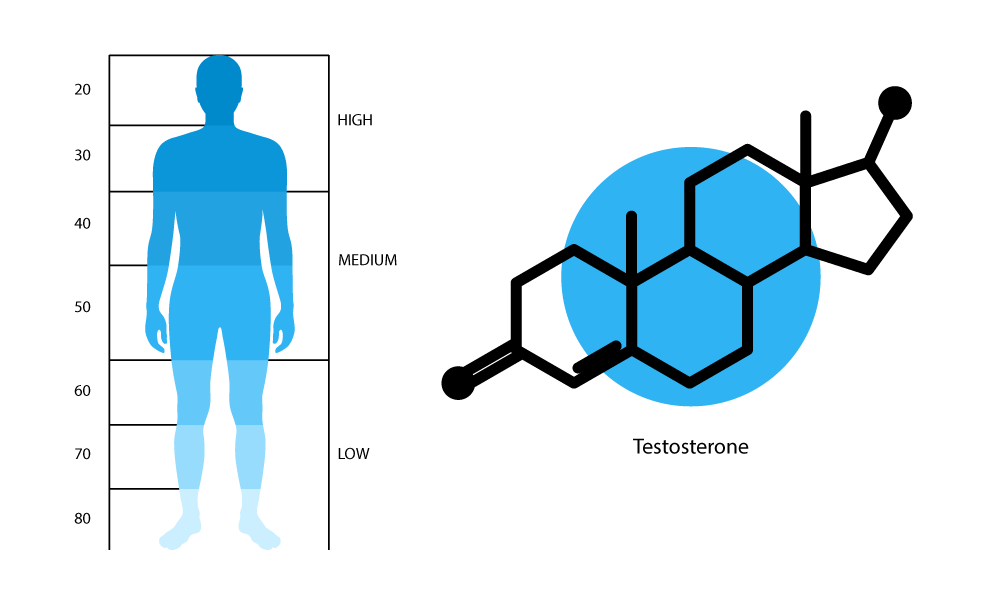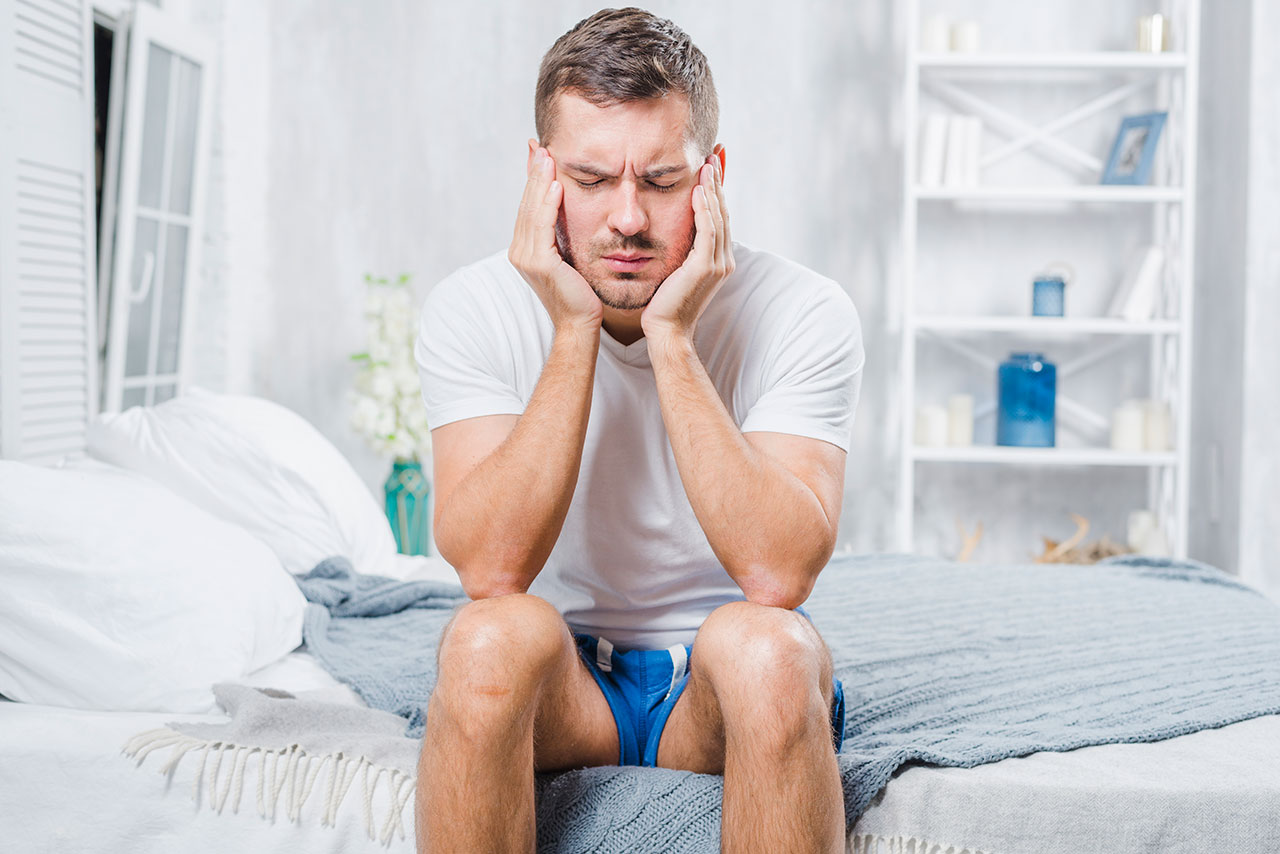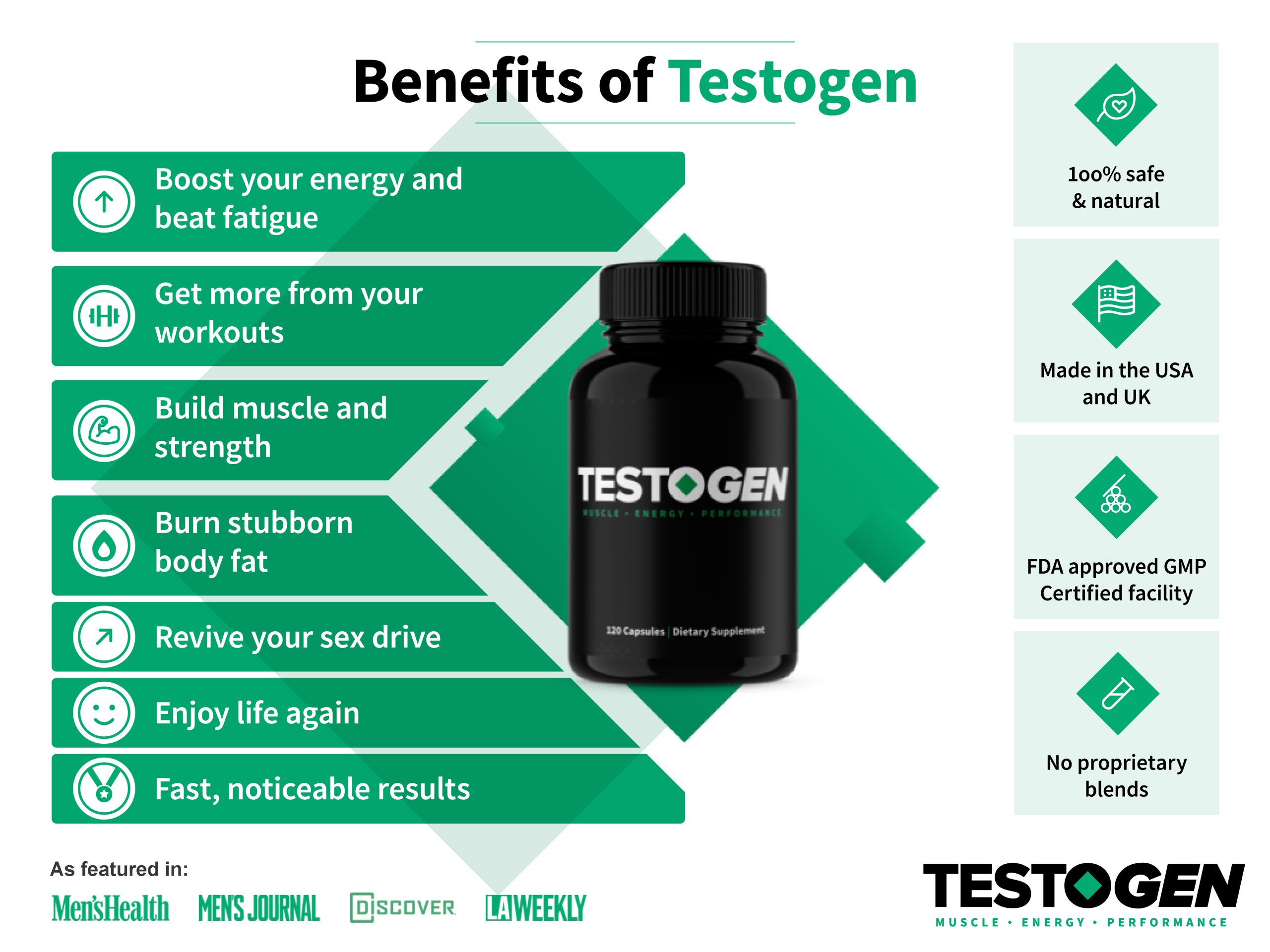Low testosterone, often referred to as “Low T,” is a condition that can impact various aspects of a person’s health and well-being. As we age, the natural decline in testosterone levels may lead to a range of symptoms affecting physical, emotional, and cognitive aspects of life. Recognizing the signs and understanding the remedies available is crucial for maintaining a healthy and vibrant lifestyle.
In this article, we will delve into the world of low testosterone, exploring its symptoms and offering insights into effective remedies. From the subtle changes in energy levels to the more noticeable effects on muscle mass and mood, low testosterone can manifest in diverse ways. Join us on this journey to uncover the keys to addressing low testosterone and regaining vitality. Let’s empower ourselves with knowledge and explore the various strategies, both natural and medical, that can help counter the challenges posed by low testosterone levels.
Symptoms of Low Testosterone

A. Physical Symptoms:
- Decreased Muscle Mass: One of the hallmark signs of low testosterone is the gradual loss of muscle mass. Testosterone plays a crucial role in maintaining and building muscle tissue. As levels decline, individuals may notice a decrease in muscle mass, making it challenging to retain strength and achieve the same muscle definition they once had. Incorporating strength training exercises into one’s routine can be beneficial in mitigating this symptom, promoting muscle growth, and enhancing overall physical well-being.
- Fatigue and Low Energy: Low testosterone levels can contribute to persistent fatigue and a noticeable decrease in energy levels. Individuals may find themselves feeling tired even after a full night’s sleep, impacting their ability to engage in daily activities with the same vigor. Addressing fatigue associated with low testosterone involves a multifaceted approach, including proper sleep hygiene, regular exercise, and maintaining a well-balanced diet rich in nutrients.
- Increased Body Fat: Imbalances in testosterone levels can lead to an increase in body fat, particularly around the abdomen. This shift in fat distribution is linked to hormonal changes that affect metabolism and the body’s ability to burn calories efficiently. Engaging in regular cardiovascular exercise and adopting a healthy eating plan can aid in managing weight and reducing excess body fat, thereby supporting efforts to address this physical symptom.
- Sexual Dysfunction: Low testosterone can significantly impact sexual health, leading to various forms of sexual dysfunction. Men may experience a decrease in libido, difficulty achieving or maintaining an erection (erectile dysfunction), and a decline in overall sexual satisfaction. Open communication with a healthcare professional is essential to explore potential remedies, including lifestyle changes, medications, or hormone replacement therapy, tailored to individual needs and preferences.
Understanding and addressing these physical symptoms of low testosterone is crucial for individuals seeking to regain control of their physical well-being. By implementing targeted lifestyle changes and considering appropriate medical interventions, it’s possible to navigate the challenges posed by low testosterone and work towards achieving a healthier, more balanced life.
B. Emotional Symptoms:
- Mood Swings: Low testosterone levels can influence mood stability, leading to unexplained mood swings. Individuals may find themselves oscillating between periods of irritability, frustration, and even sadness. These mood fluctuations can impact personal relationships and overall well-being. Incorporating stress management techniques, such as mindfulness and relaxation exercises, can be instrumental in stabilizing mood and promoting emotional balance.
- Depression and Irritability: A significant correlation exists between low testosterone levels and an increased likelihood of experiencing symptoms of depression and irritability. Persistent feelings of sadness, hopelessness, or irritability should not be ignored, and seeking professional guidance is essential. Mental health support, including counseling or therapy, may be recommended to address these emotional symptoms effectively.
Navigating the emotional aspects of low testosterone involves not only recognizing the impact on mood but also implementing strategies to foster emotional resilience. Engaging in activities that bring joy, maintaining social connections, and seeking support from friends, family, or mental health professionals can contribute to emotional well-being.
Understanding and addressing emotional symptoms is a vital step in the journey toward holistic health. By acknowledging the emotional impact of low testosterone and proactively seeking support, individuals can take significant strides towards achieving emotional balance and overall well-being.
C. Cognitive Symptoms:
- Cognitive Decline: Low testosterone levels have been associated with cognitive decline, impacting various cognitive functions such as memory, attention, and spatial abilities. Individuals may notice subtle changes in cognitive performance, such as forgetfulness or difficulty concentrating on tasks. Adopting brain-boosting activities, including puzzles, cognitive exercises, and a nutrient-rich diet, may contribute to maintaining cognitive function and supporting overall brain health.
- Poor Concentration and Memory: Declining testosterone levels can affect concentration and memory, making it challenging to focus on tasks and retain information. Cognitive symptoms may manifest as forgetfulness or the inability to recall details easily. Incorporating cognitive exercises, maintaining a consistent sleep schedule, and ensuring proper nutrition are essential strategies to support cognitive function and mitigate the impact of low testosterone on memory and concentration.
D. Summary of Common Symptoms:
Low testosterone, a condition that often accompanies the natural aging process, manifests through a range of symptoms affecting various aspects of an individual’s life. Recognizing and understanding these symptoms is essential for those seeking to address the challenges posed by low testosterone levels.
Recognizing these symptoms is the first step toward proactive management and intervention. Whether through lifestyle changes, natural remedies, or medical treatments, individuals can navigate the complexities of low testosterone and work toward achieving a balanced and fulfilling life.
Read our review on Testogen and find out yourself why its one of the best testosterone booster in the market! Read the testimonials of the users who are happy to share their before and after image profiles!
Causes of Low Testosterone

Low testosterone levels can be attributed to a variety of factors, and understanding the underlying causes is crucial for effective management and intervention. Here are some common contributors to low testosterone:
A. Aging:
- Natural Decline: As individuals age, there is a natural decline in testosterone production, typically beginning around the age of 30. This gradual reduction can lead to various symptoms associated with low testosterone.
B. Medical Conditions:
- Hypogonadism: A medical condition where the testicles do not produce enough testosterone. It can be present at birth or develop later in life due to injury or infection.
- Chronic Illnesses: Conditions such as diabetes, obesity, and chronic kidney disease can impact testosterone production.
- Hormonal Disorders: Disorders affecting the pituitary gland or hypothalamus, which play a crucial role in regulating testosterone production.
C. Lifestyle Factors:
- Poor Diet: Inadequate nutrition, particularly deficiencies in essential vitamins and minerals, can contribute to low testosterone levels.
- Lack of Exercise: Sedentary lifestyles and insufficient physical activity can be associated with lower testosterone levels.
- Excessive Stress: Chronic stress can elevate cortisol levels, which may negatively impact testosterone production.
D. Medications:
- Opioids: Long-term use of opioids for pain management can suppress testosterone production.
- Corticosteroids: Certain medications used to treat inflammatory conditions can impact hormonal balance.
E. Environmental Factors:
- Endocrine Disruptors: Exposure to environmental pollutants and endocrine-disrupting chemicals can interfere with hormone production.
- Lack of Sleep: Inadequate or disrupted sleep patterns can contribute to hormonal imbalances, including lower testosterone levels.
F. Genetic Factors:
- Klinefelter Syndrome: A genetic condition where males are born with an extra X chromosome, leading to underdeveloped testes and lower testosterone levels.
- Genetic Variations: Some individuals may have genetic factors that affect testosterone production.
Understanding the diverse causes of low testosterone allows for a more targeted approach to addressing the condition. Whether through lifestyle modifications, medical interventions, or a combination of both, individuals can take proactive steps to manage and mitigate the impact of low testosterone on their overall health.
Diagnosis
Determining whether an individual has low testosterone involves a comprehensive assessment that considers both symptoms and laboratory testing. The diagnostic process is crucial for accurate identification and effective management. Here’s an overview of how low testosterone is diagnosed:
A. How Low Testosterone is Diagnosed:
- Symptom Evaluation:
- Healthcare professionals begin by conducting a thorough evaluation of the individual’s symptoms. This may involve discussions about changes in energy levels, mood, sexual function, and physical well-being.
- Medical History:
- Obtaining a detailed medical history is essential. Information about existing medical conditions, medications, lifestyle factors, and family history provides valuable context for the diagnostic process.
- Physical Examination:
- A physical examination may be conducted to assess overall health and identify any physical manifestations of low testosterone, such as changes in muscle mass or body fat distribution.
- Blood Tests:
- Blood tests are a key component of the diagnostic process. These tests measure testosterone levels in the blood. It’s important to note that testosterone levels can vary throughout the day, so multiple tests may be recommended to establish a baseline.
- Hormonal Panel:
- In addition to testosterone, a hormonal panel may be conducted to assess levels of other hormones, such as luteinizing hormone (LH) and follicle-stimulating hormone (FSH), which play a role in testosterone production.
- Additional Testing:
- Depending on the individual’s medical history and symptoms, additional testing may be recommended. This could include imaging studies, such as an MRI, to assess the structure of the pituitary gland or testes.
B. The Importance of Consulting a Healthcare Professional:
It’s crucial for individuals experiencing symptoms of low testosterone to consult a healthcare professional for a comprehensive evaluation. Self-diagnosis and self-treatment can lead to ineffective or potentially harmful outcomes. A healthcare provider can interpret test results, consider individual health factors, and recommend an appropriate course of action, whether through lifestyle modifications or medical interventions.
Understanding the diagnostic process empowers individuals to take an active role in their health. By seeking professional guidance and participating in a thorough evaluation, individuals can make informed decisions about addressing low testosterone and improving their overall well-being.
Remedies and Treatment Options:

Addressing low testosterone involves a range of remedies and treatment options aimed at restoring hormonal balance and alleviating associated symptoms. From lifestyle changes to medical interventions, individuals have various paths to consider on their journey to optimal health:
A. Lifestyle Changes:
- Diet and Nutrition:
- Adopting a diet rich in essential nutrients, including zinc, vitamin D, and omega-3 fatty acids, can support testosterone production. Incorporating whole foods such as lean proteins, fruits, and vegetables contributes to overall well-being.
- Exercise and Physical Activity:
- Regular physical activity, particularly strength training and cardiovascular exercise, can enhance testosterone levels. Developing a consistent exercise routine promotes muscle health and helps manage body weight.
- Sleep and Stress Management:
Prioritizing quality sleep and implementing stress management techniques, such as meditation and deep breathing exercises, are crucial for hormonal balance. Adequate rest and stress reduction contribute to overall health and well-being.
B. Natural Remedies:
- Herbal Supplements:
- Certain herbs, such as ashwagandha, fenugreek, and tribulus terrestris, have been studied for their potential to support testosterone levels. However, it’s essential to consult with a healthcare professional before incorporating supplements into one’s routine.
- Dietary Changes:
- Specific foods, including garlic, ginger, and pomegranate, are believed to have testosterone-boosting properties. Integrating these foods into a balanced diet can complement other lifestyle changes.
C. Medical Treatments:
- Testosterone Replacement Therapy (TRT):
- TRT involves administering testosterone in various forms, such as injections, gels, or patches. This medical intervention is prescribed and monitored by healthcare professionals to address low testosterone levels effectively.
- Hormone Therapy Options:
- In some cases, hormonal therapies may be recommended to address underlying hormonal imbalances. These may include treatments to stimulate the production of testosterone or regulate related hormones.
D. Mental Health and Emotional Well-being:
- Managing Mood and Stress:
- Addressing emotional symptoms involves adopting strategies to manage mood swings, depression, and irritability. Counseling or therapy may be beneficial for individuals navigating the emotional impact of low testosterone.
- Seeking Professional Help:
- Mental health professionals can provide support and guidance for individuals experiencing emotional challenges associated with low testosterone. Seeking professional help is a proactive step towards emotional well-being.
By exploring these remedies and treatment options, individuals can tailor an approach that aligns with their preferences and health goals. Taking proactive steps towards addressing low testosterone empowers individuals to reclaim control over their health and vitality.
Prevention and Maintenance:

While addressing low testosterone is essential, adopting preventive measures and maintenance strategies can contribute to overall hormonal health. Incorporating these practices into one’s lifestyle can potentially reduce the risk of developing low testosterone and support long-term well-being:
A. Tips for Maintaining Healthy Testosterone Levels:
- Balanced Diet:
- Maintain a diet rich in essential nutrients, including vitamins D, C, and zinc. Nutrient-dense foods support overall health and contribute to hormonal balance.
- Regular Exercise:
- Engage in regular physical activity, including both cardiovascular exercise and strength training. Exercise promotes muscle health, helps manage body weight, and supports testosterone levels.
- Adequate Sleep:
- Prioritize quality sleep to ensure the body’s natural hormonal rhythms are maintained. Aim for 7-9 hours of uninterrupted sleep each night.
- Stress Management:
- Implement stress-reducing techniques, such as mindfulness, meditation, or yoga. Chronic stress can negatively impact hormone levels, including testosterone.
- Maintain a Healthy Weight:
- Strive for a healthy body weight through a combination of balanced nutrition and regular exercise. Excess body fat, especially around the abdomen, can contribute to hormonal imbalances.
B. Lifestyle Choices for Preventing Low Testosterone:
- Limiting Alcohol Consumption:
- Excessive alcohol intake can negatively impact testosterone production. Moderation in alcohol consumption supports hormonal health.
- Avoiding Endocrine Disruptors:
- Minimize exposure to environmental pollutants and endocrine-disrupting chemicals. This includes choosing natural cleaning products and being mindful of exposure to certain plastics.
- Regular Health Check-ups:
- Schedule regular check-ups with healthcare professionals to monitor overall health, including hormonal levels. Early detection of potential issues allows for timely intervention.
- Limiting Stressors:
- Identify and manage sources of chronic stress. Whether through work, relationships, or personal challenges, addressing stressors proactively contributes to hormonal balance.
- Moderation in Sugar Intake:
- High sugar intake can lead to insulin resistance, which may negatively impact testosterone production. Adopting a balanced and low-sugar diet supports overall health.
Incorporating these preventive measures and maintenance strategies into daily life can contribute to hormonal balance and overall well-being. While these practices can support healthy testosterone levels, it’s essential to consult with healthcare professionals for personalized advice based on individual health needs.
Conclusion
Embarking on the journey to address low testosterone involves a multifaceted approach that encompasses understanding symptoms, identifying causes, exploring remedies, and adopting preventive measures. This comprehensive guide has shed light on the intricacies of low testosterone and provided insights into the diverse strategies available for individuals seeking to reclaim their vitality.
As we conclude, it’s important to recognize that the path to hormonal balance is highly individual. What works for one person may differ for another, emphasizing the significance of personalized approaches. Whether through lifestyle changes, natural remedies, or medical interventions, the key lies in informed decision-making guided by professional advice.
Remember, the journey doesn’t end here. Continual self-awareness, regular health check-ups, and an ongoing commitment to well-being form the foundation for sustained hormonal health. By embracing the knowledge shared in this guide and staying attuned to your body’s signals, you empower yourself to make choices that align with your health goals.
As you navigate the complexities of low testosterone, may this information serve as a valuable resource, empowering you to take proactive steps towards optimal hormonal health. Your journey to vitality is uniquely yours, and with the right knowledge and support, you can thrive in every aspect of life.
Additional Resources:
- Mayo Clinic – Testosterone therapy: Potential benefits and risks:
- Harvard Health Publishing – Testosterone and the heart:
- WebMD – Understanding Low Testosterone — Diagnosis and Treatment:
These resources offer valuable insights, research findings, and expert opinions on topics related to low testosterone. Remember to consult with healthcare professionals for personalized advice and to verify information from reputable sources.



